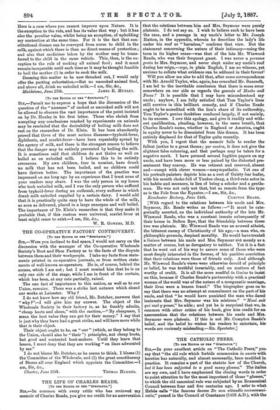THE LIFE OF CHARLES RRADE. [To THE 1111)1T011 or TM
"113171CTAT08."] Snt—In common with every critic -who has reviewed -my memoir of Charles Reade, you give me credit for an asseveration that the relations between him and Mrs. Seymour were purely platonic. I do not say so. I wish to believe such to have been the case, and a passage in my uncle's letter to Mr. Joseph Hatton, in the appendix, wherein he describes the lady's life under his roof as "harmless," confirms that view. But the statement concerning the nature of their intimacy—using the term in its higher sense—was that of the late Mr. Winwood Reade, who was their frequent guest. I was never a persona grata to Mrs. Seymour, and never slept under my uncle's roof during her reign,—ergo, in plain English, I am no witness, yet anxious to collate what evidence can be adduced in their favouF Will you allow me also to add that, after some correspondence with Mr. Arnold Taylor, who, again, has consulted Mr. Bancroft, I am led to the inevitable conclusion that there is some error somewhere on our side as regards the genesis of Masks and Faces'? It is possible that I may have misunderstood my uncle ; anyhow, I am fully satisfied that Tom Taylor's lines still survive in this brilliant comedy, and if Charles Reade ought to be accredited with the lion's share of its authorship, Tom Taylor's genius doubtless conduced largely, if not mainly, to its success. I owe this apology, and give it readily and with- out qualification, pleading, however, in the same breath, that Charles Reade's name, whether in England or America, ought in equity never to be dissociated from this drama. It has been entirely displaced for that of Taylor quite recently.
With you, I regret that the memoir fails to render the- fullest justice to a great theme; per contra, it does not give the slightest false colouring, and that perhaps may be taken for a. negative merit. I have perused several fugitive papers on my uncle, and have been more or less pained by the distorted pre- sentment they convey. He was reticent and reserved, absent and—except with clever women—unsympathetic. Yet one of his portrait-painters depicts him as a sort of Gaiety-bar loafer, with his month choke-full of Yankee slang, a third-rate actor in his habits and manners, in lieu of being a scholar and a gentle- man. He was not only not 'that, but as remote from the type as is the Pole from the Equator.—I am, Sir, Ise., Senchester Rectory, June 24th. COMPTON READS.
[With regard to the relations between his uncle and Mrs. Seymour, Mr. Reade writes as follows r—" It must be cate- gorically asserted, on the individual authority of the late Mr. Winwood Reade, who was a constant inmate subsequently of their house in Bolton Row, that the friendship between these two was platonic. Mr. Winwood Reads was an avowed atheist, the bitterest enemy of Christianity of his age,—a man who, on philosophic grounds, despised morality. He would have treated a liaison between his uncle and Mre. Seymour nbt merely as a. matter of course, but as derogatory to neither. Yet it is a fact that he went out of his way to assure some of those who were most deeply interested in the former, of his positive conviction that their relations were those of friends only. And although Mr. Winwood Reade's views were otherwise devoid of principle- or belief, he was truthful invariably, •and on matters of fact worthy of credit. It is all the more needful in limine to insist on this, because if Charles Reade's partnership with a practical woman of the world was of the nature of a morganatic marriage, their lives were a brazen fraud." The biographer goes on te- mp that there was no attempt at concealment on the part of his uncle, and that "he would have punished the man who dared, insinuate that Mrs. Seymour was his mistress." " Honi sett qui mai y pence," he adds ; and yet he is surprised that we, in common with other critics of his book, give him credit for en asseveration that .the relations between his uncle and Mrs. Seymour were platonic. If this is not Mr. Compton Reade's belief, and the belief he wishes his readers to entertain, hie- words are curiously.misleading.---En. Spectator.]


































 Previous page
Previous page